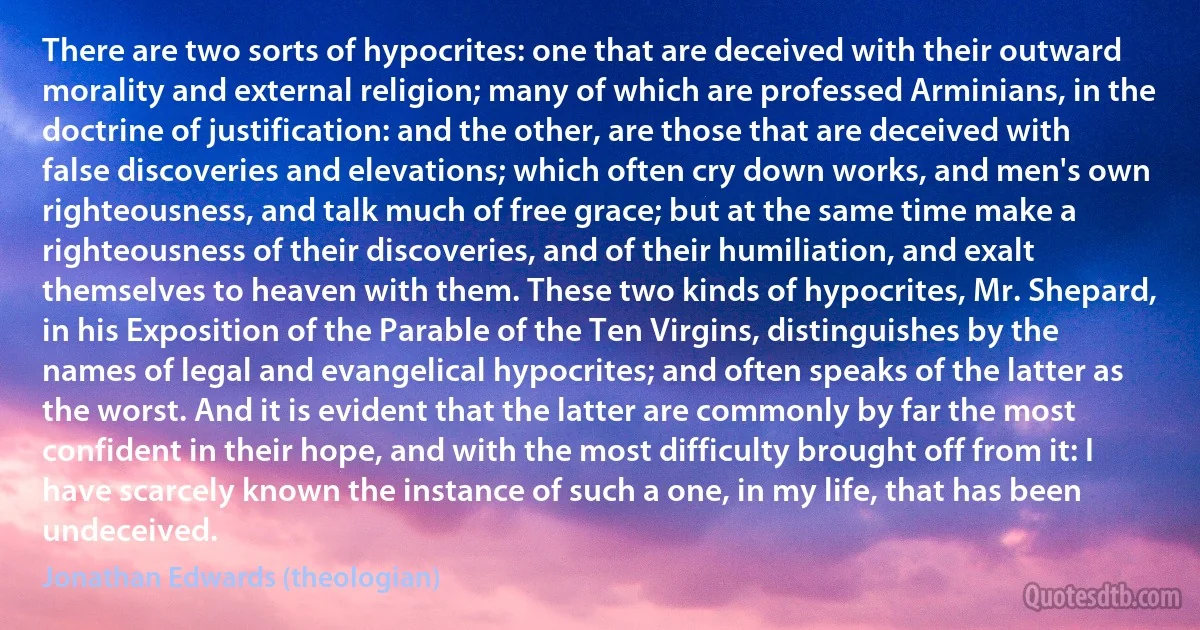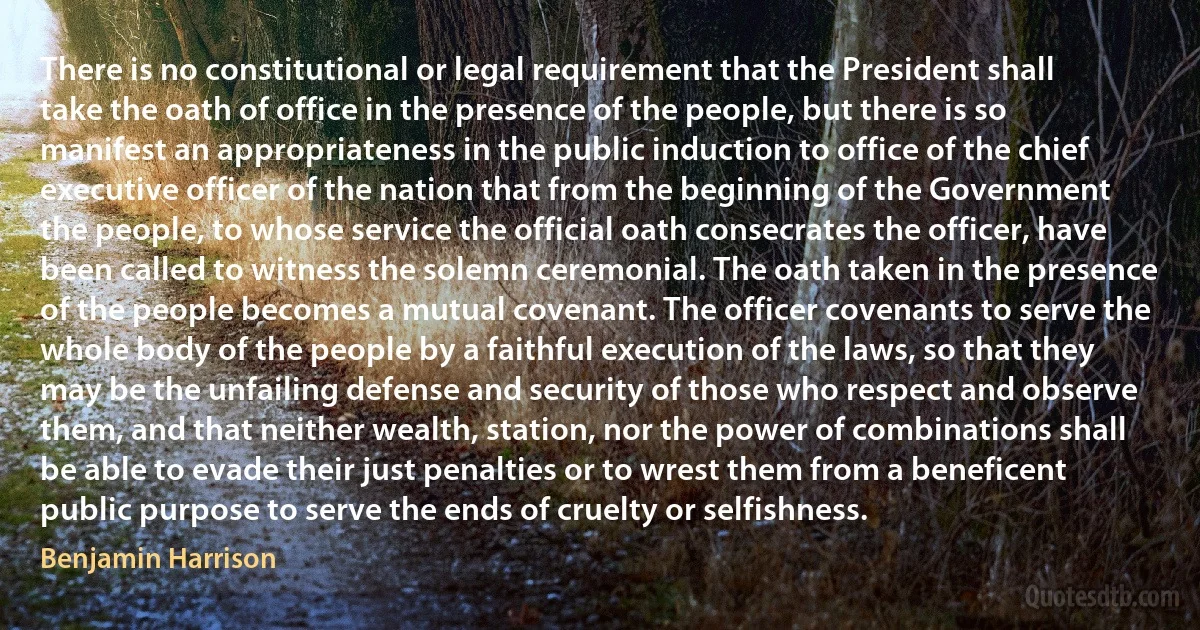Legal Quotes - page 36
Some people view the public domain with contempt. In their brief before the Supreme Court, the Nashville Songwriters Association wrote that the public domain is nothing more than "legal piracy." But it is not piracy when the law allows it; and in our constitutional system, our law requires it. Some may not like the Constitution's requirements, but that doesn't make the Constitution a pirate's charter.
As we've seen, our constitutional system requires limits on copyright as a way to assure that copyright holders do not too heavily influence the development and distribution of our culture. Yet, as Eric Eldred discovered, we have set up a system that assures that copyright terms will be repeatedly extended, and extended, and extended. We have created the perfect storm for the public domain. Copyrights have not expired, and will not expire, so long as Congress is free to be bought to extend them again.

Lawrence Lessig
I recognize the fact that the sacrifices made by the Italian Jews during the war were considerable and generous, but now it is a question of examining certain political positions and of indicating what line the government might eventually adopt... This is in the interest of the Jews, who, having fled from the pogroms of Ukraine and Poland, must not meet Arab pogroms in Palestine; moreover, it is advisable that the Western nations should refrain from creating a painful legal position for the Jews, since to-morrow those same Jews, becoming citizen-subjects of those States, might immediately form foreign colonies within them.

Benito Mussolini
I've mentioned WikiLeaks, because surely what could be more open than publishing all the material? Because that is what Julian Assange did. He wasn't content with the way the newspapers published it to be safe and legal. He threw it all out there. That did end up with vulnerable people in Afghanistan being exposed. It also meant that the Belarussian dictator was given a handy list of all the pro-democracy campaigners in that country who had spoken to the U.S. government. Is that radical openness? I say it's not, because for me, what it means, it doesn't mean abdicating power, responsibility, accountability, it's actually being a partner with power. It's about sharing responsibility, sharing accountability. Also, the fact that he threatened to sue me because I got a leak of his leaks, I thought that showed a remarkable sort of inconsistency in ideology, to be honest, as well.

Heather Brooke
Today, grave dangers attend the process of hastening withdrawal, and the legal safeguards will require most careful working out, and even then grave and serious issues might develop. But some hastening of the processes of death is in order and must be worked out. Primarily, however, the will-to-die of the patient is not based at this time on knowledge and on mental polarisation, or upon an achieved continuity of consciousness, but on emotional reactions and a shrinking from pain and from fear. Where, however, there is terrible suffering and absolutely no hope of real help or of recovery, and where the patient is willing (or if too ill, the family is willing), then, under proper safeguards, something should be done. But this arranging of the time to go will not be based on emotion and upon compassion, but on the spiritual sciences and upon a right understanding of the spiritual possibilities of death.

Alice Bailey
Reward for information leading to the apprehension of -
Jesus Christ
Wanted - For Sedition, Criminal Anarchy - Vagrancy, and Conspiring to Overthrow the Established Government.
Dresses poorly, said to be a carpenter by trade, ill-nourished, has visionary ideas, associates with common working people, the unemployed and bums. Alien - believed to be a Jew. Alias: "Prince of Peace. Son of Man." "Light of the world" &c. &c. Professional Agitator, Red beard, marks on hands and feet the result of injuries inflicted by an angry mob led by respectable citizens and legal authorities.

Jesus Christ
The urban renewal programme is one of the most spectacular urban programmes to have been undertaken in Paris; it is certainly the one which has provoked the biggest public outcry. The renewal programme in the strict sense of the term, has two essential characteristics:
1) It concerns an already structured social space, of which it changes the form, the social content and/or function.
2) It is based on public initiative, whatever the legal or financial form of the renewal agency, where private enterprise may take over the work, as in the case of Opératioll Italie.

Manuel Castells
We call our country home of the brave and land of the free, but it's not. We give a false portrayal of freedom. We're not free - if we were, we'd allow people their freedom. Prohibiting something doesn't make it go away. Prostitution is criminal, and bad things happen because it's run illegally by dirt-bags who are criminals. If it's legal, then the girls could have health checks, unions, benefits, anything any other worker gets, and it would be far better.

Jesse Ventura
Another feature of the reversal of the Speenhamland method was less obvious to most nineteenth-century writers, namely, that the wage system had to be made universal in the interest also of the wage-earners themselves, even though this meant depriving them of their legal claim to subsistence. The "right to live" had proved a death trap to them.

Karl Polanyi
The United States should have an equal and simultaneous support for both the legitimate security concerns of Israel, and the human rights, dignity and economic opportunities of the Palestinian people... I do not believe the settlements on the West Bank are legal. Also, I would rescind the president's affirmation of sovereignty of Israel over the Golan Heights. I understand the occupation of the Golan Heights, but only until there is a stable government in Syria with whom one can negotiate. According to international law, the occupation of a territory does not give the occupying country a right to annex it. Also, according to international law, the resources of the occupied territory are to be used for the good of those living there. I also do not support the blockade of Gaza.

Marianne Williamson
It was characteristic of the economic system of the nineteenth century that it was institutionally distinct from the rest of society. In a market economy, the production and distribution of material goods is carried on through a self-regulating system of markets, governed by laws of its own, the so-called laws of supply and demand, motivated in the last resort by two simple incentives, fear of hunger and hope of gain. This institutional arrangement is thus separate from the noneconomic institutions of society: its kinship organization and its political and religious systems. Neither the blood tie, nor legal compulsion, nor religious obligation, nor fealty, nor magic created the sociologically defined situations that insured the participation of individuals in the system. They were, rather, the creation of institutions like private property in the means of production and the wage system operating on purely economic incentives.

Karl Polanyi
Some of the same people who were instrumental in the Federalist Society's effort to change our legal system are now working to help corporations increase their control over the flow of information.
If you control the flow of information, you can control the conversation around important issues. If you can control the conversation, you can change this country. ... But we can't be satisfied with stopping conservatives and their corporate clients from controlling the narrative when it comes to our legal system.
We have to fight back with our own.
In our narrative, the legal system doesn't exist to help the powerful grow more powerful – it exists to guarantee that every American is entitled to justice
In our narrative, we defend our individual rights and liberties against corporate encroachment just as fiercely as we defend them against government overreach.

Al Franken
Esotericism, which is legal, but not too much fun, prescribes to our condition. But when one tries to follow a spiritual path, nothing much happens for most of us. Faced with this lack of results, the esoteric schools put the blame squarely on us rather than on any insufficiency in their doctrines or methods. Finally, they explain our failure by taking refuge in paradoxes. They tell us, for example, that we can attain only by not wanting to attain-a neat double bind.
Some esoteric schools caution the disciple not to practise the extraordinary powers which we will acquire in the course of our work. This is surely an extraordinary statement. Most of us can't muster the power to give up smoking, much less to levitate.

Robert Sheckley
Senior journalists including some editors had the time of their lives acting as self-appointed advisers to the president or prime minister. Slanderous stories doubting his patriotism were planted in the press. He [therefore] cannot be blamed for sending a message to Rajiv Gandhi that he too, was consulting legal experts on the possible dismissal of the prime minister or his prosecution on corruption charges.

Zail Singh
The State must be made efficient for the work which concerns only the people of the State; and the nation for that which concerns all the people. There must remain no neutral ground to serve as a refuge for lawbreakers, and especially for lawbreakers of great wealth, who can hire the vulpine legal cunning which will teach them how to avoid both jurisdictions.

Theodore Roosevelt
I was personally concerned and involved in child rights-related activities right from my childhood. Then over a period of time I realized that it is not possible that one person can make substantial change; so it is necessary to build an organization of like minded people and sensitize other people to join. I knew right from the beginning that child labor is not just a technical or legal issue and also not merely an economic issue. It's a combination of several things. It's a deep-rooted social evil and to wipe it out we have to build a strong movement. Bachpan Bachao Andolan has never been a typical NGO but it has emerged as a movement over a period of time.

Kailash Satyarthi
President Trump claims the election was stolen.
The assertions range from specific local allegations to constitutional arguments to sweeping conspiracy theories.
I supported the president's right to use the legal system. Dozens of lawsuits received hearings in courtrooms all across our country, but over and over, the courts rejected these claims, including all-star judges whom the president himself has nominated.

Mitch McConnell
The Sabbath being regarded as a shadow or type of that heavenly repose which the righteous will enjoy when this world has passed away, 'so these six days of creation are so many periods or millenniums for which the world and the toils and labours of our present state are destined to endure.' The Mosaic account was thus reduced to a poetic myth... But if this symbolic interpretation, which is now generally accepted, be the true one, what becomes of the Sabbath day? It is absolutely without ecclesiastical meaning. The man who was executed for gathering sticks on that day must therefore be regarded as the victim of a rude legal rendering of a religious epic.

John Tyndall
We are not about to leave the field of doing good simply because harm might happen ... In our four-year publishing history no one has ever come to physical harm that we are aware of or that anyone has alleged. On the other hand, we have changed governments and constitutions and had tremendous positive outcomes...We wanted to make the news, not be the news. But that produced extraordinary curiosity as to who we were ... this attempt not to be the news, made us the news... We are creating a space behind us that permits a form of journalism which lives up to the name that journalism has always tried to establish for itself. We are creating that space because we are taking on the criticism that comes from robust exposure of powerful groups... We do not have national security concerns. We have concerns about human beings.. We have had over 100 legal attacks. We have been victorious in almost every single legal attack... we operate within the rule of law.

Julian Assange
The U.S. government directed, as Craig Murray so eloquently documented, the London prosecutor James Lewis. Lewis presented these directives to Baraitser. Baraitser adopted them as her legal decision. It was judicial pantomime. Lewis and the judge insisted they were not attempting to criminalize journalists and muzzle the press while they busily set up the legal framework to criminalize journalists and muzzle the press. And that is why the court worked so hard to mask the proceedings from the public, limiting access to the courtroom to a handful of observers and making it hard and at times impossible to access the trial online. It was a tawdry show trial, not an example of the best of English jurisprudence but the Lubyanka.

Julian Assange
They had made the mistake of thinking of a personality as some sort of possession, like a suit of clothes, which a person wears. But apart from a personality what is there? Some bones and flesh. A collection of legal statistics, perhaps, but surely no person. The bones and flesh and legal statistics are the garments worn by the personality, not the other way around.

Robert M. Pirsig



